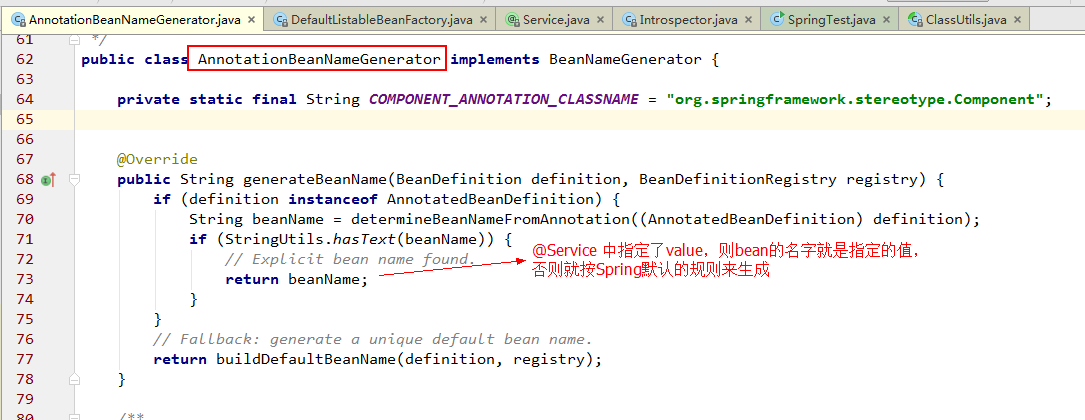今天碰到一个问题,写了一个@Service的bean,类名大致为:BKYInfoServcie.java
dubbo export服务的配置:
<dubbo:service interface="com.xxx.XxxService" ref="bKYInfoServcie" />
结果启动报错:找不到名为bKYInfoServcie的bean
bean的名字不是我预期的"bKYInfoServcie",临时将bean的名字指定成了bKYInfoServcie来解决的,即:@Service("bKYInfoServcie")
但还是觉得比较奇怪,之前一直以为Spring对注解形式的bean的名字的默认处理就是将首字母小写,再拼接后面的字符,但今天看来不是这样的。
回来翻了一下原码,原来还有另外的一个特殊处理:当类的名字是以两个或以上的大写字母开头的话,bean的名字会与类名保持一致

/**
* Derive a default bean name from the given bean definition.
* <p>The default implementation simply builds a decapitalized version
* of the short class name: e.g. "mypackage.MyJdbcDao" -> "myJdbcDao".
* <p>Note that inner classes will thus have names of the form
* "outerClassName.InnerClassName", which because of the period in the
* name may be an issue if you are autowiring by name.
* @param definition the bean definition to build a bean name for
* @return the default bean name (never {@code null})
*/
protected String buildDefaultBeanName(BeanDefinition definition) {
String shortClassName = ClassUtils.getShortName(definition.getBeanClassName());
return Introspector.decapitalize(shortClassName);
}
/**
* Utility method to take a string and convert it to normal Java variable
* name capitalization. This normally means converting the first
* character from upper case to lower case, but in the (unusual) special
* case when there is more than one character and both the first and
* second characters are upper case, we leave it alone.
* <p>
* Thus "FooBah" becomes "fooBah" and "X" becomes "x", but "URL" stays
* as "URL".
*
* @param name The string to be decapitalized.
* @return The decapitalized version of the string.
*/
public static String decapitalize(String name) {
if (name == null || name.length() == 0) {
return name;
}
// 如果发现类的前两个字符都是大写,则直接返回类名
if (name.length() > 1 && Character.isUpperCase(name.charAt(1)) &&
Character.isUpperCase(name.charAt(0))){
return name;
}
// 将类名的第一个字母转成小写,然后返回
char chars[] = name.toCharArray();
chars[0] = Character.toLowerCase(chars[0]);
return new String(chars);
}
原文地址:https://www.cnblogs.com/kevin-yuan/p/5437140.html
